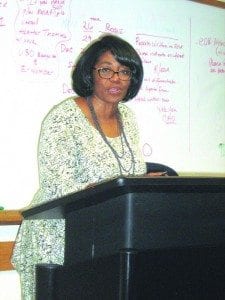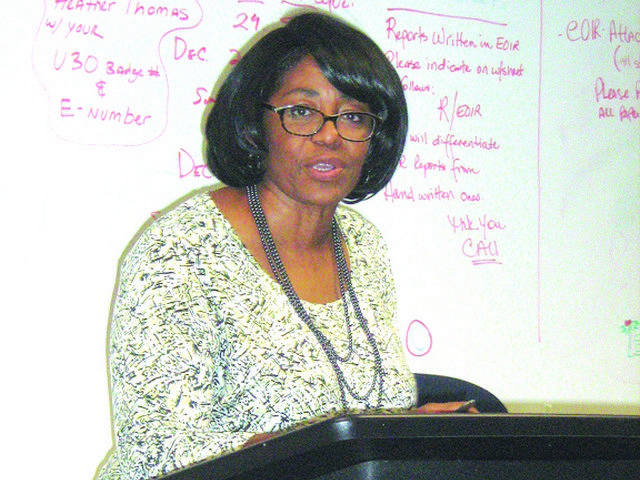
For 60 years the “dynamic diversity” of Miami-Dade County has inspired Vickie Jackson to focus her life on bettering human relations.
“Building bridges of mutual respect” is her foremost priority today as an executive committee member of the Miami-Dade County Community Relations Board.
“For me, race is not a color. I tell others who ask if I am Cuban or black that I’m whatever you want me to be,” she told a Nov. 18 meeting of the of Miami-Dade Police Hammocks District Citizens Advisory Committee (CAC).
She described CRB efforts to lessen racial tensions while creating understanding.
A native South Floridian, Jackson has served multiple civic initiatives that include co-chairing the Criminal Justice and Law Enforcement Committee while working with local, state and federal agencies to promote non-violent solutions to street demonstrations after the Trayvon Martin trial.
“Whenever the need arises, we’re there to contain the pressures so often the result of poor communication,” she said
A Realtor with Richmond-Perrine Realty with a lengthy career in technology, Jackson traced the history of the CRB since its formation by the Miami-Dade Commission in 1963, adding personal touches that emphasized efforts to create intergroup harmony among diverse nationalities that comprise the county’s 2.5 million population.
The CRB is composed entirely of volunteers like Jackson and a single paid staff member, Amy Carswell, all of whom serve as advisors to the mayor and county commission as well as the community at large, she said.
After the murder of a rabbi, synagogue vandalism and incidents at the West Kendall Islamic School, the CRB during the past year convened an “I Am My Brothers’ Keeper Interfaith Assembly,” bringing together religious, community and law enforcement leaders “to share healing words and provide mutual support.”
Other current activities:
•Recommending adoption of a county ordinance prohibiting discrimination in housing, public accommodations and employment based on gender identity and expression;
• Supporting an ordinance to combat wage theft and hold perpetrators responsible and restore income to victimized individuals, and
•Co-hosting and engaging activists and service providers in community forums and educational programs, commemorating the 50th anniversary year of the Civil Rights Act.
Under the umbrella of Community Advocacy, the CRB works with five other major organizations devoted to specialized areas, including the Commission for Women, established in 1971 to advise on status of women; Hispanic Affairs (1992) identifying needs of Hispanic residents; Black Affairs (1994) raising awareness of tax-supported services available in Miami-Dade government; Asian-American (1997) advocate for the Asian community, and Military Affairs (2012) recommending on military matters.
Recent neighborhood shootings and violence among youth have led the county CRB to plan a series of community forums in high impact areas with the City of Miami CRB and other advocacy organizations. Scheduled for early 2016, the sessions to share information and identify resources will be held at community centers in Perrine, Culmer, Liberty City, Homestead, Little Haiti and Little Havana.
The CRB Criminal Justice and Law Enforcement Committee also is currently working on an action plan to reduce tensions and enhance trust between police and residents. It has been distributed to CRB members, county commissioners and community organizations.
“Whatever the cause or moment, our boards are there to bring people together in a safe environment when issues arise that cause tensions,” said Jackson who also serves as president of the Community Health Foundation of South Florida, which raises funds for its crisis center serving mental needs of children.
“From my own point of view, we are all still learning to become part of the human race — not a race of any one color,” she concluded.





